“I owe it to you to say frankly that this effort to build a communist republic on the basis of a strongly centralised state communism under the iron law of party dictatorship is bound to end in failure.”
Prophetic words from Peter Kropotkin, Russian philosopher,
shortly after the Bolshevik revolution
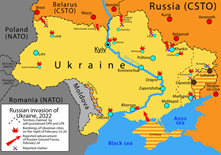 An old stock market adage describes the key drivers of share price movements as fear and greed, but it's clear that Putin's invasion of Ukraine is also driven by these same motives. Together with a comprehensive disregard for human rights, it shows how the legacy of the past one hundred years of communism has left that centralised dictatorship with a total moral vacuum and, judging by their nuclear warning yesterday, a degree of insanity.
An old stock market adage describes the key drivers of share price movements as fear and greed, but it's clear that Putin's invasion of Ukraine is also driven by these same motives. Together with a comprehensive disregard for human rights, it shows how the legacy of the past one hundred years of communism has left that centralised dictatorship with a total moral vacuum and, judging by their nuclear warning yesterday, a degree of insanity.
Fear and greed are both rooted in self-interest, a complete absence of any attempt to understand and respect the situation of others. Such a lack of consciousness accentuates their focus, in the same way that, in the case of fear, anxiety is heightened when one walks into a room in complete darkness, or that, in the case of greed, irrational desire fuels compulsion with gambling.
The democratic world must balance very carefully its response to Putin’s aggression: too little, and it will place Taiwan in China’s firing line. Too much, and we risk igniting a third world war.
So in this commentary we contribute our voice to the search for a way out of this mess.
On 31 January, in ‘A Dangerous Convergence’, we highlighted the unfortunate combination of the gas stranglehold, weak leadership in Europe and western abandonment of Afghanistan; it has indeed given Putin the window of opportunity for his attempt at annihilating democratic Ukraine.
The war will force us to address the first two of these three, although it is only humanitarian relief which can make any amends for the tragedy of Afghanistan, as we noted on 23 August last year. There is no doubt that dictatorial strength will only recognise and respect a strong and united response, and the US, UK and EU are now doing their best to achieve that.
However, we must look deeply at the origins of the fear and greed in Moscow in order to understand how it feeds this dictatorial system.
just a few hours after the first shots were fired in Putin's war, Melvyn Bragg presented his BBC Radio 4 ‘In Our Time’ programme on Peter Kropotkin, one of the forerunners of the 19th century origins of socialism. As the quote at the head of our commentary shows, he explained how the Marxist concept of communism would lead directly to a breed of elites controlling the lives of others: that's why he was an early proponent of anarcho-communism.
It is sad that Russia should have transited directly from feudalism into communism, both of which spread fear among the people and instil greed in the elite. But it was sadder still that their flickering candle of Christianity was snuffed out in the process, for if there is one redeeming feature which can rid us of fear and greed it is love and compassion for others.
And so it was another curious coincidence in the BBC's broadcasting schedule on 24 February, the day that Putin started his war, that BBC4 television chose to screen ‘Mission: Joy’ — an 80-minute celebration of the week that Archbishop Desmond Tutu spent with the Dalai Lama in 2015. This remarkable film brought out the very best of these spiritual leaders, and warrants much wider coverage.
The particularly interesting theme of the film is their agreement that selfless care for others is the foundation of a happy and joyful life. The Dalai Lama speaks movingly of calm and meditation, but it was Archbishop Tutu who spoke of the transformation that comes from an absolute focus on the needs of others, whatever their background. And his extraordinary leadership of the Truth and Reconciliation process by which apartheid ended peacefully in South Africa is a living witness to his commitment and courage in making it happen.
At the very heart of this issue is the fact that unconditional love cannot be static. It must flow through each one of us in on to others, particularly for those who are in need, otherwise it will go stagnant — like water trapped in a static pond.
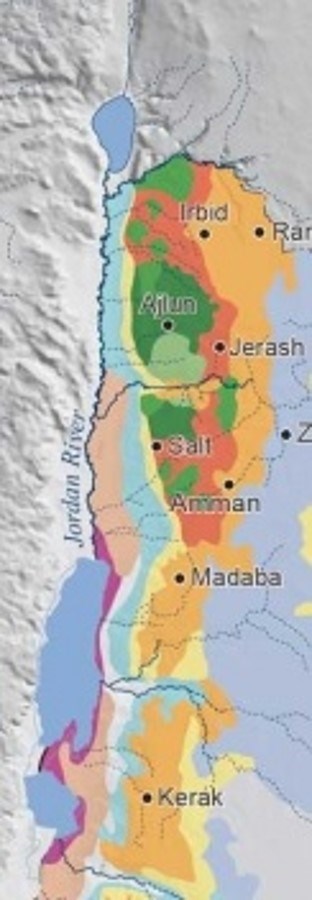
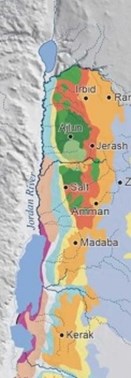 It is this flow of unconditional love about which we wrote just a couple of weeks ago with the opening quote from Archbishop Anastasios, whose home country of Albania: so close to Ukraine.
It is this flow of unconditional love about which we wrote just a couple of weeks ago with the opening quote from Archbishop Anastasios, whose home country of Albania: so close to Ukraine.
“The two lakes between Israel and Jordan have a principal feature in common and a basic difference. Both receive the waters of the River Jordan. The first, the Sea of Galilee, receives the water and shares it to fertilise the southern regions. The second, the Dead Sea, receives the water but keeps it for itself. In the first, there is plenty of life within its waters and around them. In the second, there is no sign of life.
We have the privilege of receiving continuously the living water of the spiritual Jordan: that is, the unconditional love which is God. We receive continuously a great many gifts – spiritual and material. If we keep them only for ourselves, we shall lose them. The Dead Sea remains the symbol of what it means merely to receive and keep for oneself. If we share, we shall be like the Sea of Galilee, full of life. Receiving and sharing is the secret for having life.”
Archbishop Anastasios of Tirana, Durres and All Albania
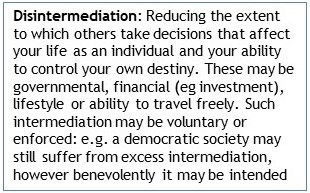
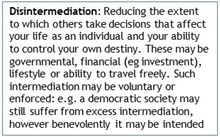 As an aside, it’s interesting to note that if you apply this flow dynamic to ‘control’ in the same way as with unconditional love, it does achieve much of that which Peter Kropotkin was advocating. That’s why we speak so often of disintermediation in this commentary.
As an aside, it’s interesting to note that if you apply this flow dynamic to ‘control’ in the same way as with unconditional love, it does achieve much of that which Peter Kropotkin was advocating. That’s why we speak so often of disintermediation in this commentary.
Which brings us back to fear and greed, that evil pair of imposters. Somehow, we must get this message of unconditional love for others going viral in Russia and China so that it takes hold within their populations and brings about a genuine change in hearts and minds.
Shortly after the downfall of Russian communism we had a young Russian working with us in the early days of The Share Centre. She explained how Russians felt that the West owed them something for giving up communism, as if their transition from that new form of feudal security was done as a favour to us.
Unfortunately, the free world has not done nearly enough to show that unconditional love for others over the past thirty years, and perhaps the reason why Putin can get away with his abhorrent behaviour is that so few people in Russia have really tasted western freedom and generosity.
If we can navigate our way through the dangerously narrow path between giving way to brutal dictators and provoking a war to end all wars, we must learn how to show and share the message of unconditional love for others.
Gavin Oldham OBE
Share Radio

